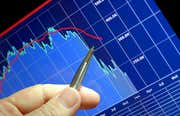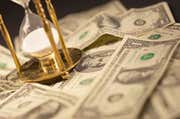When: 2007-2009
Where: U.S. and British housing markets; credit crisis occurred around the world
How Much: The S&P 500 declined 57.8% from its intraday high of 1,576.1 on October 11, 2007 to its low of 666.8 on March 6, 2009. Indicators of credit risk such as the "Ted Spread" and the option-adjusted spread (OAS) on corporate bonds hit record highs.
The American Dream
Following the burst of the tech bubble and the recession of the early 2000s, the Federal Reserve kept short-term interest rates low for an extended period of time. This coincided with a global savings glut, as developing countries and commodity-producing nations accumulated large financial reserves. As these excess savings were invested, global interest rates declined to record low levels. Frustrated with low returns, investors began to assume more risk by seeking higher returns wherever they could be found. For several years, global financial markets entered a period which came to be called the "Great Moderation" due to the above-average returns and below-average volatility demonstrated by a wide variety of asset classes.
In the United States, the Great Moderation coincided with a housing boom, as prices soared (particularly on the coasts and in cities such as Phoenix and Las Vegas). Rising home prices led to rampant real estate speculation, and also fueled excessive consumer spending as people began to view their homes as a piggy bank that they could extract cash from to fuel discretionary purchases. As home prices soared and many homeowners stretched to make their mortgage payments, the possibility of a collapse grew. However, the true extent of the danger was hidden because so many mortgages had been securitized and turned into AAA-rated securities.
It Turns Out Housing Prices Do Go Down After All
When the long-held belief that home prices do not decline turned out to be inaccurate, prices on mortgage-backed securities plunged, prompting large losses for banks and other financial institutions. These losses soon spread to other asset classes, fueling a crisis of confidence in the health of many of the world's largest banks. Events reached their climax with the bankruptcy of Lehman Brothers in September 2008, which resulted in a credit freeze that brought the global financial system to the brink of complete collapse.
Unprecedented central bank actions combined with fiscal stimulus (notably in the U.S. and China) helped ease some of the panic in the markets, but by late winter 2009, rumor had it that Citigroup Inc., Bank of America Corp., and other large banks would have to be nationalized if the global economy was to survive. Fortunately, the aggressive actions by governments around the world eventually helped avoid financial collapse, but the credit freeze forced the global economy into the worst recession since World War II.
The credit crisis and accompanying recession caused unprecedented volatility in financial markets. Stocks by more than half from their highs in October 2007 to their lows in March 2009. (They have since recovered to surpass previous all-time highs.) Fixed-income markets also displayed unprecedented volatility, with corporate bond markets at one point forecasting bankruptcies at a level not seen since the Great Depression. The oil price fell by more than two thirds.
The Long Process of Deleveraging
Investors and consumers are likely to live with the repercussions of the financial crisis for years to come. In many countries, including the U.S., consumers remain heavily leveraged and many homeowners are "underwater," owing more than their homes are worth. As consumers continue to deleverage and repair their finances, their purchasing patterns may be permanently altered. Many developed market countries have also seen a substantial deterioration in their fiscal position. While government actions helped prevent worst-case outcomes from the credit crisis, large budget deficits now represent a structural problem that may still take decades to solve.
The Financial Scars
Finally, investors have experienced the most volatile and frightening markets of their life. Positive lessons can be learned from the crisis, such as the importance of diversification and independent analysis, but there are also emotional effects that must be considered. In particular, investors must remember that the events of the crisis were unusual and are unlikely to be repeated; while excessive greed in the financial markets is inappropriate, so too is excessive fear. Investors who can incorporate the lessons of the credit crisis without having their emotions unduly influenced will be best positioned for future investment success.
Market Crashes: Conclusion
-
 Insights
InsightsLessons Learned From the Banking Crisis
There are lessons to be learned on how to handle severe financial downturns, and while the Fed is learning, politicians may not be. -
 Insights
Insights3 Financial Crises in the 21st Century
Take a look at several of the most prominent financial crises of the 21st century, and understand why the Great Recession was a truly remarkable contraction. -
 Managing Wealth
Managing WealthInvesting In Crisis, A High Risk-High Reward Strategy
The financial crisis of 2008 and the great recession that followed is still fresh in the memories of many investors. -
 Insights
InsightsWhy the Stock Market Isn't Affected by Slow GDP Growth
Learn how the stock market reached new levels in the years following the financial crisis, even though U.S. economic conditions were consistently weak. -
 Investing
InvestingWhy Housing Market Bubbles Pop
Home price appreciation is not assured. Can you withstand the volatility in this market?



